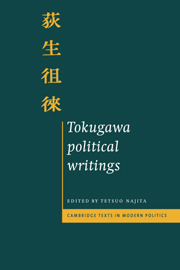Book contents
- Frontmatter
- Contents
- Preface
- Acknowledgements
- Editor's introduction: Interpreting the historicism of Ogyū Sorai
- Principal events in the life of Ogyū Sorai
- Biographical synopses
- Guide to further reading
- Glossary
- BENDŌ A DISCOURSE ON THE WAY
- BENMEI I THE CLARIFICATION OF NAMES (WITH ADDENDA FROM BENMEI II)
- KEIZAIROKU SHŪI ADDENDUM TO “ON THE POLITICAL ECONOMY”
- Index
Preface
Published online by Cambridge University Press: 04 August 2010
- Frontmatter
- Contents
- Preface
- Acknowledgements
- Editor's introduction: Interpreting the historicism of Ogyū Sorai
- Principal events in the life of Ogyū Sorai
- Biographical synopses
- Guide to further reading
- Glossary
- BENDŌ A DISCOURSE ON THE WAY
- BENMEI I THE CLARIFICATION OF NAMES (WITH ADDENDA FROM BENMEI II)
- KEIZAIROKU SHŪI ADDENDUM TO “ON THE POLITICAL ECONOMY”
- Index
Summary
An understanding of modern political consciousness in Japan is inconceivable without reference to the intellectual history of the Tokugawa period, the era between 1600 and 1868 that preceded Japan's modern transformation. Even as they revolted against their feudal past, modern intellectuals were inextricably drawn to Tokugawa Confucian thought, a conceptual construct that defies simple and stylized characterization.
One of the pivotal referent figures in this history is Ogyu Sorai (1666–1728). Sorai's historicism claimed that all sure knowledge must be sought and discovered not in accordance with cosmological norms but within history itself, and, most importantly, in the “beginnings” of history when the rationale for social organization was first articulated. For Sorai, the original purpose was to distribute justice in an orderly and precise manner and to nourish diverse human virtues. This intent, therefore, ought to inform political analysis and reform over the course of all subsequent history. Two of Sorai's texts are provided here in translation: One is the Bendo that focuses on the meaning of the Way; the other, the Benme on names. A short piece by Sorai's student, Dazai Shundai (1680–1747), has been added to suggest the influence of Sorai's thinking. My introductory essay will serve to situate Sorai as a thinker and as a significant intellectual resource for modern and contemporary Japan.
To maintain some “distance” for Sorai's Tokugawa texts from contemporary East Asian civilizations, I have used the “old-fashioned” Wade– Giles system of romanizing Chinese names and terms.
- Type
- Chapter
- Information
- Tokugawa Political Writings , pp. vii - xPublisher: Cambridge University PressPrint publication year: 1998
- 1
- Cited by

